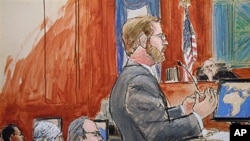The prosecution in the terror trial of Ahmed Ghailani portrayed the accused on Monday as a mass murderer in the 1998 bombings of two U.S. embassies in Africa that killed 244 people. Our correspondent was in the U.S. federal courtroom in New York City where the prosecution made its closing arguments.
Assistant U.S. Attorney Harry Chernoff rejected the defense's claim that Ahmed Ghailani was duped by al-Qaida operatives in their plan to bomb the U.S. embassies in Kenya and Tanzania.
Chernoff recapped evidence and witness testimony that indicated Ghailani was involved in many aspects of the bombing. Ghailani, he said, was identified as being present at locations in Mombasa and Dar es Salaam with other members of the plot. The prosecutor recalled FBI expert witnesses who found explosive residue at those locations along with documents showing that the defendant was there. The FBI testified that it found a blasting cap in an armoire used by Ghailani in Dar es Salaam.
Chernoff also pointed to testimony of neighbors who recalled that a clothing store in Mombasa went from a once thriving business to a secretive hideout where Ghailani associated with foreigners who were identified as co-conspirators.
The prosecution highlighted testimony of a salesman who identified Ghailani as the man who tried to negotiate the price of the truck used in the Dar es Salaam attack. Testimony from welders in the Tanzanian capital indicated that the defendant made requests to purchase several oxygen and acetylene tanks. Explosives experts say 19 such tanks were used to increase the destructive force of the Tanzanian blast.
Prosecutor Chernoff also recalled Ghailani's fingerprint, which was found on a cell phone bill registered in his name. The phone was last used about two hours before the attack by the suicide bomber who drove the truck to the embassy. The jury was also reminded of fake passports with Ghailani's photo and tickets under the same alias for a flight to Pakistan the day before the blast. Additional evidence showed that two senior al-Qaida operatives were on the same flight with Ghailani.
Ghailani's attorneys did not call witnesses for the defense. The defendant also declined Judge Lewis Kaplan's offer that he testify in his own defense. The defense is scheduled to make its closing arguments on Tuesday.




